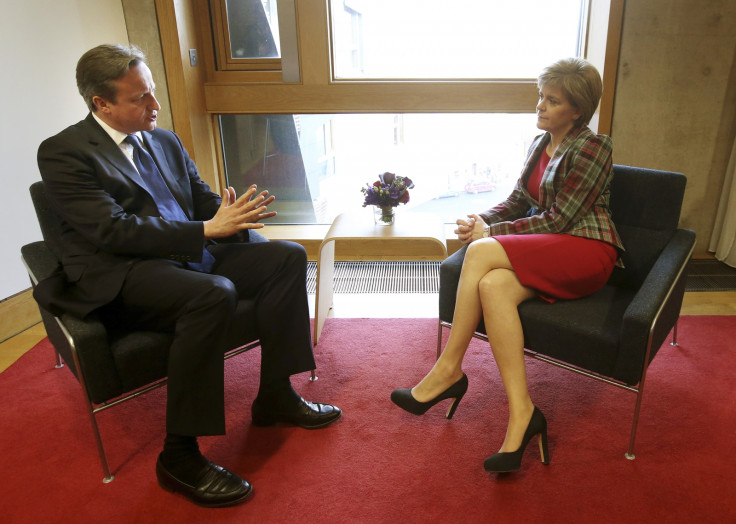Cameron must accept the SNP's anti-austerity mandate, or the UK is finished

Not long after it became clear that David Cameron was heading for a surprise majority, something happened that baffled me. English Tory supporters started taking to social media to gloat about the imminent demise of the SNP, a party that had just secured the most stunning triumph in British electoral history. What on Earth were they getting at? Had ITV put on a replay of the 1983 election as a practical joke?
It turned out that these people felt the union between Scotland and England was now safe, because the Tory win had banished the SNP from any meaningful influence at Westminster, thus ensuring that English voters would not be aggravated into casting Scotland adrift. You see, only England has agency. The only possible threat to the union comes from English irritation, and if that threat is eliminated, SNP support must ultimately wither.
As I got to grips with this alien logic, I had an epiphany. It suddenly dawned on me that the easiest explanation for the collapse of the London-based parties in Scotland is their catastrophic failure to empathise with the Scottish voter. You'd think it would be elementary – surely anyone who feels that it's intolerable for the SNP to mildly influence the government of England should have no problem at all in understanding why Scots are unlikely to accept a government wholly elected by another country? Not a bit of it. The honest expectation is that Scotland will accept with equanimity what England would never accept in a million years, and will revert to impotently voting Labour as nature intended.
A lesson from history
For his own sake as well as Scotland's, it must be hoped that Cameron himself is considerably more thoughtful than some of his supporters. Constitutionally, he has the option of pretending that the SNP landslide never happened, and using the majority he won in England to govern Scotland as if it was Tory Surrey. But he surely has a long enough memory to recall what the consequences were the last time a Conservative prime minister took such a cavalier approach to democracy. In the 1987 election, the Tories slumped to an all-time low in Scotland, even as they were winning a thumping majority throughout the UK. Margaret Thatcher paid no heed at all to her lack of mandate north of the border, and proceeded to impose the Poll Tax on Scots a year earlier than the rest of the UK. What happened afterwards is the stuff of legend.
The electoral divergence between Scotland and England is, of course, even more extreme this time. The Tory government has just one seat in Scotland, compared to the 10 Thatcher was left with after the 1987 rout. The other seats are not dominated by a Labour party content to bide its time until it can build a UK-wide majority, but by a pro-independence party that will not accept the legitimacy of Tory rule unless the "vow" which secured the No vote in last year's referendum is implemented in full. That perhaps wouldn't pose such a problem for Cameron if the policies that he has received a clear English mandate to implement weren't so utterly irreconcilable with the policies that the SNP have won an even clearer (in fact much, much clearer) Scottish mandate for. In Scotland, the democratic will is for an end for austerity, in England it is for swingeing cuts.
The 'One Nation' rule that Cameron rather oddly promises is almost a contradiction in terms when the nation in question has just spoken with two distinct voices. If London rule is to be maintained, the only way of respecting the Scottish people's wishes is to exempt them from the austerity imposed on everyone else. That is surely inconceivable. Ironically, a compromise to cover the whole UK probably could have been reached if a Labour minority government had taken office with the support of the SNP. Cameron chose to whip up irrational fear about that possibility in England, and now he must live with the consequences. In the light of Thursday's result, the circle can only be squared by constitutional change. Any previous distinction between Nicola Sturgeon's demands for an end to austerity and for more powers to be transferred to the Scottish Parliament has suddenly vanished, because under a Tory majority government the first is literally impossible without the second.
Is Sturgeon waiting for Brexit?
The evidence on whether Cameron has got that memo is mixed. In his victory speech, he did appear to acknowledge that more powers for Scotland and Wales were an indispensable part of any "One Nation" approach. But it's unclear whether he's still labouring under the misapprehension that the Smith Commission proposals, and in particular his own government's minimalist interpretation of those proposals, will be remotely adequate. If he's really serious about his claimed desire for Scotland and England to rub along together, he must recognise the other key part of the message sent by Scottish voters – namely that they do not accept that Smith represents a fulfilment of the Vow. The half-hearted agreement hammered out after the referendum must now be considered a floor for the negotiations to come, not a ceiling.
In the meantime, Cameron has already unwittingly solved a problem for Nicola Sturgeon. Until Thursday, she faced a huge dilemma – could she really disappoint the tens of thousands of new SNP members by refusing to include a pledge for a second independence referendum in her Holyrood manifesto? But now we know there is a very real chance that Britain will soon opt to leave the European Union, which by any standards would constitute the "material change in circumstances" that Sturgeon has suggested will be necessary before a new vote on independence can be held.
It is surely now beyond question that the SNP manifesto will at least contain a conditional commitment for an independence referendum in the event of "Brexit". What remains to be seen, however, is whether any other trigger for a referendum will also be listed, for example failure on the part of the UK government to deliver on the Vow to the Scottish people's satisfaction. I wouldn't be at all surprised – after all, if our experience of Thatcher and Major is anything to go by, Tory majority governments are unlikely to prove responsive until confronted with a threat.
James Kelly is the author of the Scottish pro-independence blog, SCOT goes POP! Voted one of the UK's top political bloggers, you can hear more from James on @JamesKelly.
© Copyright IBTimes 2025. All rights reserved.






















